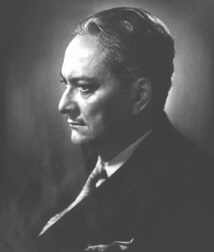

Excerpts from
Questions and Answers
Fundamentals of the Esoteric Sciences
by Manly P. Hall
(1) What is the difference between Religions and Philosophy?
Religion is satisfied to worship; philosophy seeks to understand. Religions are paths of the heart; philosophies paths of the mind. Emotion is a dominant factor in religion, but plays a small part in a philosopher's code. It seldom occurs to the religious person that salvation must be earned; to him belief and acceptance are the foundations of security. Prayer and penance are might forces to the religiously minded, but the zealot seldom inquires into the nature of the God to whom he prays and seldom attempts to analyse the efficacy of the penances. By the philosopher, intelligent living is regarded as more efficacious than platitudes and affirmations, and knowledged more virtuous than blind acceptance.
In ancient times religion and philosophy constituded one body of learning . All priests were philosophers and all philosophers were priests. After the decline of Classical civilization, the body of knowledge was divided. Religion and philosophy became separate institutions. Religion was left mindless, and philosophy heartless. The result was the sad dilemma that we find today - blind theologies on the one hand, and materialistic, soulless philosophies on the other.
But the student must differentiate between the morbid, conflicting philosophies of today and the great ideals for which original philosophy stood. For that reason there is little use in studying
modern philosophies, nor can modern translations of old philosophies always be trusted. To the metaphysician, philosophy means that sublime department of ancient learning which has been justly called the " science of sciences".
The purpose of philosophy is to discover Truth, to understand truth, to lift the intellect into final union with the Angeless wisdom that sustains the world. This was also the original task of religion. In modern theologies, however, the purposes of religion are obscured and hundreds of petty sects are casting lots for garments of authority . Religion is purification, philosophy is wisdow ; religion is aspiration, philosophy is realization.
In religion man comes to love Truth, and through philosophy, to attain truth. The beginning of the path is the realization of the reality of things unseen, and and the consummation of life is to be one with that sovereign and perfect knowledge which religion has called the "Light of Ages" .
(2) Give a practical definition of mysticism.
There are three terms in common use among metaphysians that should receive exact definition. Exoterically speaking, occultism is the intellectual approach to truth; mysticism is the emotional approach to truth. Esoterically, the occultist desires to posses wisdom; the mystic desires to be possessed by wisdom; and the psychic , incapable of impersonalizing wisdom, seeks to achieve a spiritual state by permitting his own metaphysical organism to be controlled by other entities, by this process hoping to benefit by the experience of others. Practical mysticism may be defined as the intuitional grasp of reality. The practical mystic is one whose outer life is regulated by the beauty, gentleness, and sublimity of inward conviction. Mysticism is the sublimation of emotion. The Buddhist would define it as the transmutation of passions into compassions, the elevation of attachments from a level of particulars to level of impersonals.
From
"QUESTIONS AND ANSWERS - Fundalmentals of the Esoteric Sciences"
by Manly P. Hall , published by The Philosophical Research Society, Inc. 3910
Los Feliz boulevard, Los Angeles, CA 90027.
http://www.prs.org
![]()

A Quarterly Rosicrucian Online Magazine
Click here to return to home page.